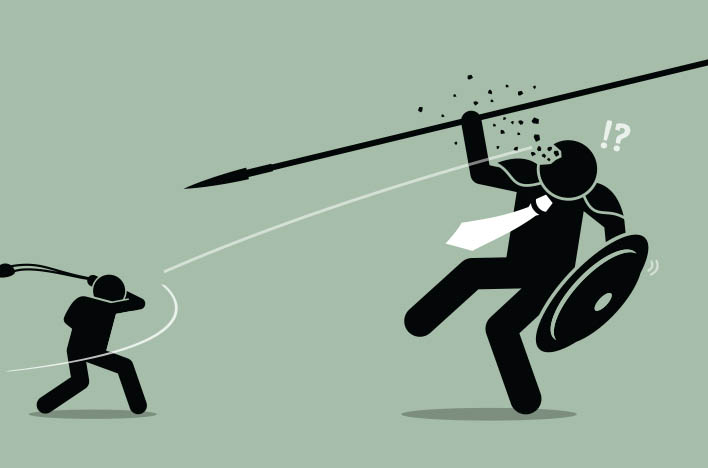Entrepreneurs take on a lot of risk to pursue their dreams.
Financial risk, product risk and market risk are always at top of mind. But another important concern is legal risk.
What if a business owner learns that his or her idea has been pirated or a big conglomerate shirks on a contract?
Taking on a large corporate opponent is formidable enough — when you add in the potential cost, it can be downright frightening.
Most attorneys charge an hourly rate for time spent on a case. According to Missouri Lawyers Weekly, the average rate in Kansas City is nearly $400 per hour. Highly specialized and experienced attorneys often charge twice that.
For litigation that goes on for months, if not years, this cost can be significant enough to dissuade entrepreneurs from pursuing even a strong case against a well-financed opponent.
Indeed, the typical hourly rate model puts all the financial risk of a case on the client. No matter the outcome of the case, the client is responsible for compensating the attorneys for their time. This can amount to hundreds of thousands of dollars, win, lose or draw.
For small business owners with limited resources, this may not be feasible. What can they do?
How Contingency Fees Work
When entrepreneurs need to fight their own Goliaths, they shouldn’t have to worry about how they’re going to afford the battle. That’s where contingency-based arrangements can help.
Under the contingency model, attorneys receive a percentage of any award collected; fees vary based on the result achieved for the client. If the attorney cannot successfully negotiate a settlement or win a jury award, the client pays no fees to the attorney. There typically are no upfront fees, retainers or hourly billing.
Although contingency fees are well-known for their use in personal injury cases, they can be effectively deployed in business litigation as well.
Entrepreneurs can use the contingency model for many types of business disputes, among them:
- Antitrust
- Breach of contract
- Breach of fiduciary duty/interference
- Fraud and misrepresentation
- Licensing, copyright and trademark infringement
- Patent infringement
- Racketeering/RICO violations
Two examples of the contingency model in action for small businesses:
- A franchisee was informed by the franchisor that it planned to buy him out. The franchisee had operated his business for three decades and wanted to pass the business to his daughter. Under the contingency model, the franchisee was able to stand up to the $4 billion franchisor and prevail after a long and contentious arbitration process.
- A technology professor created software that analyzed mutual funds. He discovered that his biggest potential customers — the country’s largest investment banking firms — were pirating his program and making it available to thousands of brokers without permission (or payment). Through the contingency model, the homegrown company took on several massive defendants and recovered more than $9 million.
Why Contingency Fees Make Sense for Entrepreneurs
Simply put, working on a contingency fee basis aligns the lawyer’s risk with the client. The attorney is only successful if the client is successful.
More importantly, this arrangement gives everyone access to the justice system. It ensures that those who have been wronged — even small and medium-sized companies — will have equal access to a lawyer and are able to protect their legal rights.
David may have appeared to be the underdog in the fight with Goliath, but he was still given the chance to compete. And in the end, he was successful.
If you are facing your own giant, ask your lawyer for alternatives to the billable hour, or consult with a law firm that specializes in contingency fee business litigation. As a small business owner, remember that there is a way to fight and defend your rights — without draining your savings on billable hours.


